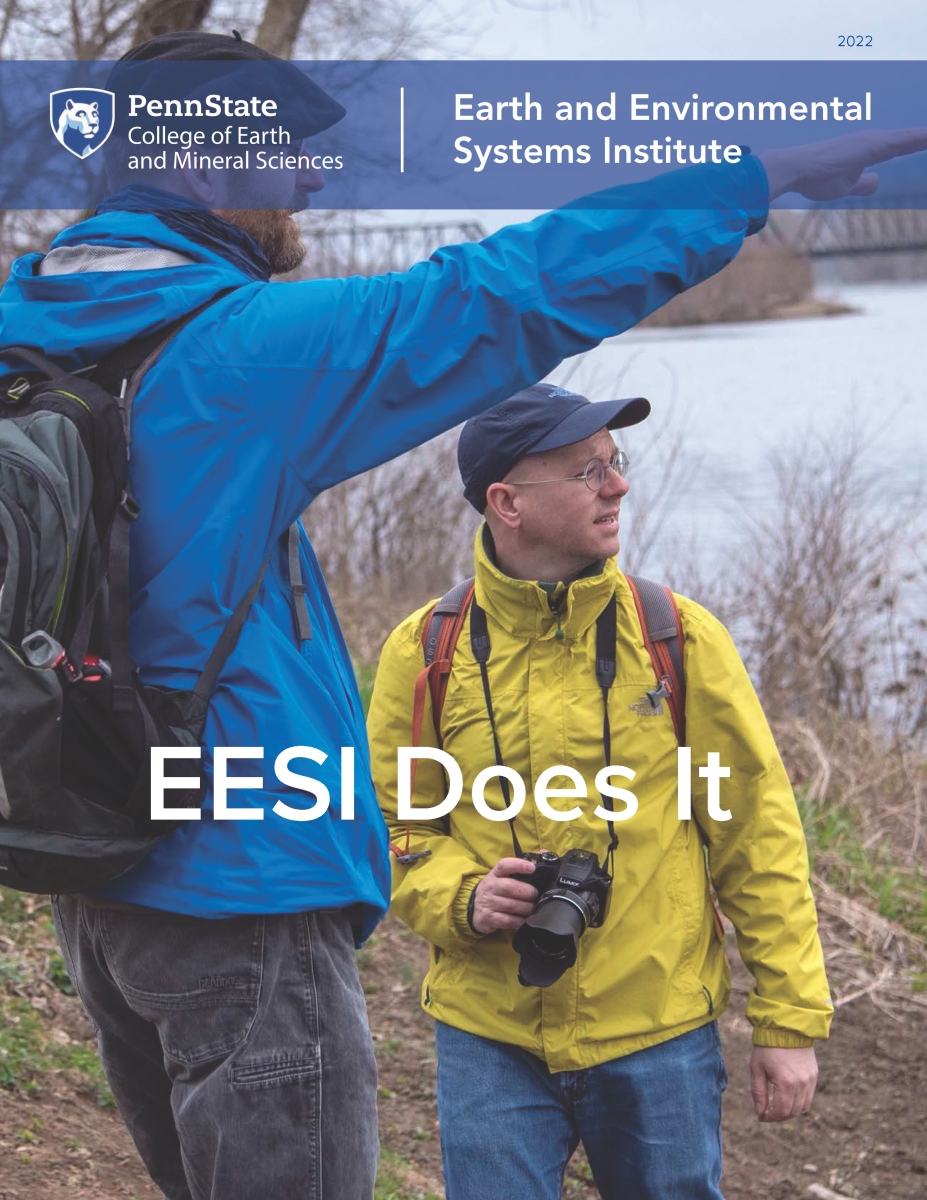Humans' unprecedented impact on the Earth’s system has led scientists to define a new geological age - the Anthropocene - to acknowledge the scale of human-induced changes to land, air, water, ice, and biota. To survive and flourish as a species in the face of this impact, we must learn to "earthcast" - that is, to predict how the Earth's climate and environment will change based on observations from the past and present considering scenarios of human behavior.
The Earth and Environmental Systems Institute is strategically positioned to engage in earthcasting. EESI associates and affiliates are world-renowned leaders in the kind of interdisciplinary, innovative, and collaborative research needed to take on the breadth of human-induced changes. The strength and diversity of their environmental sciences research promises the new knowledge, new approaches, and new models that are fundamental to understanding the Earth system, how it affects people, and how people affect it.
We welcome you to learn more about EESI, one of the leading Earth and environmental sciences research institutes in the U.S. Our focus is long in timescale and global in spatial scale. Join us.
EESI Diversity, Equity, and Inclusion Statement
Penn State is committed to and accountable for advancing diversity, equity, and inclusion in all forms. We embrace individuality and foster a culture of inclusive excellence that supports both broad and specific diversity initiatives. To do this, we leverage the educational and institutional benefits of diversity and engage all individuals to help them thrive. We value inclusive excellence as a core strength and an essential element of our public service mission.
Diversity, equity, and inclusion are top priorities for the Earth and Environmental Systems Institute and the College of Earth and Mineral Sciences. EESI supports the college’s diversity efforts and leads initiatives to foster a diverse and inclusive community of faculty and postdoctoral researchers, students, and staff. The following describe college-level programs that EESI supports, and a few EESI-led initiatives in progress or in development.
College of Earth and Mineral Sciences
- Alliance for Education, Science, Engineering & Design with Africa (AESEDA) – AESEDA builds partnerships between African institutions and Penn State’s education and research programs. Collaborations focus on education (traditional or online), research in the sciences (natural, physical, health), engineering, design, and related interdisciplinary activities that have high impact and can be operationalized and have the properties of scalability (local and regional levels). EESI provides AESEDA with facilities space for staff.
- EnvironMentors – The Penn State chapter of EnvironMentors engages underrepresented high school students in STEM research projects. Each high school student is paired with a faculty advisor and undergraduate researcher who work with the student on a year-long project. Students present their research at a symposium held during the spring semester. EESI provides the program with facilities space for Muriel Go-Maro, the EnvironMentors coordinator, and is currently working with Go-Maro and the director, Gregory Jenkins, professor of meteorology and atmospheric science, geography, and African studies, on ways for the Institute to provide more direct support to the program.
- Assessment of the Living, Learning, and Working Environment (ALLWE) in EMS – The ALLWE survey, administered in fall 2018, assessed the campus climate in the College of Earth and Mineral Sciences. The survey found that, overall, students, faculty, and staff had positive opinions of the environment fostered by the college. The survey also identified areas needing improvement, which the College of EMS is currently addressing through the ALLWE Implementation Plan. EESI has had representation in ALLWE throughout the entire process and has representatives on the current implementation steering committee.
EESI
- EarthTalks – The EarthTalks series are organized and run by associates around a specific research theme, journal club, and feature diverse topic experts from Penn State and the national research community. EESI continues to educate the academic and broader community about barriers that may inhibit a more inclusive environment. In addition, this platform highlights the achievements of renowned professionals, especially those from marginalized groups.
- EESI Environmental Scholars –Every year, six incoming graduate students are nominated to become EESI Environmental Scholars and are awarded top-up funds upon acceptance of admission to Penn State. These students are extraordinary junior scholars.
- EESI Pizza Lunches – EESI pizza lunches provide opportunities for associates to learn about one another’s work and strike up new research collaborations. Featured speakers are usually associates, especially associates new to the institute, as well as outside guests to discuss other topics. In fall 2017, the EMS dean held three inclusivity seminars, and in spring 2018 the institute hosted three additional lunches based on the book Whistling Vivaldi: How Stereotypes Affect Us and What We Can Do, by Claude Steele.



